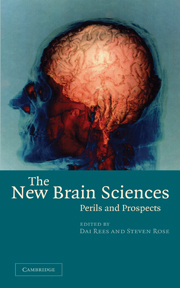Book contents
- Frontmatter
- Contents
- List of contributors
- Part I Introduction: the new brain sciences
- Part II Freedom to change
- Part III Neuroscience and the law
- 6 Human action, neuroscience and the law
- 7 Responsibility and the law
- 8 Programmed or licensed to kill? The new biology of femicide
- 9 Genes, responsibility and the law
- Part IV Stewardship of the new brain sciences
- Part V Conclusion
- References
- Index
6 - Human action, neuroscience and the law
Published online by Cambridge University Press: 08 August 2009
- Frontmatter
- Contents
- List of contributors
- Part I Introduction: the new brain sciences
- Part II Freedom to change
- Part III Neuroscience and the law
- 6 Human action, neuroscience and the law
- 7 Responsibility and the law
- 8 Programmed or licensed to kill? The new biology of femicide
- 9 Genes, responsibility and the law
- Part IV Stewardship of the new brain sciences
- Part V Conclusion
- References
- Index
Summary
A cynical view regards the criminal law as a crude system of state-enforced sanctions designed to ensure social order: punishment follows the commission of a proscribed act. In one sense this is true: criminal law involves rules, the breaking of which results in punishment, and often rather crude punishment at that (a tyrant from an earlier age would certainly recognise a contemporary prison cell in a British prison, even if he might remark on its relative degree of comfort). This view of criminal law, however, is a very shallow one, and an anachronistic one too. Criminal justice is not purely concerned with the undiscriminating regulation of anti-social behaviour; a modern criminal justice system has far more sophisticated tasks than the mere punishment of those who break the law. These include the need to be imaginative in response to crime and to take into account the range of possible measures that can be invoked to deal with the offender. They also include the need to take into account the moral implications of the system and to ensure that the system is fair to those to whom it reacts. This is demanded not only by the moral imperative that the state should only punish the guilty, but by the pragmatic requirement that to be effective, the criminal justice system should enjoy a reasonable measure of popular support. A harsh system of criminal justice, which lacks the consent of the governed, will simply not work in an open and liberal society.
- Type
- Chapter
- Information
- The New Brain SciencesPerils and Prospects, pp. 103 - 122Publisher: Cambridge University PressPrint publication year: 2004
- 3
- Cited by



